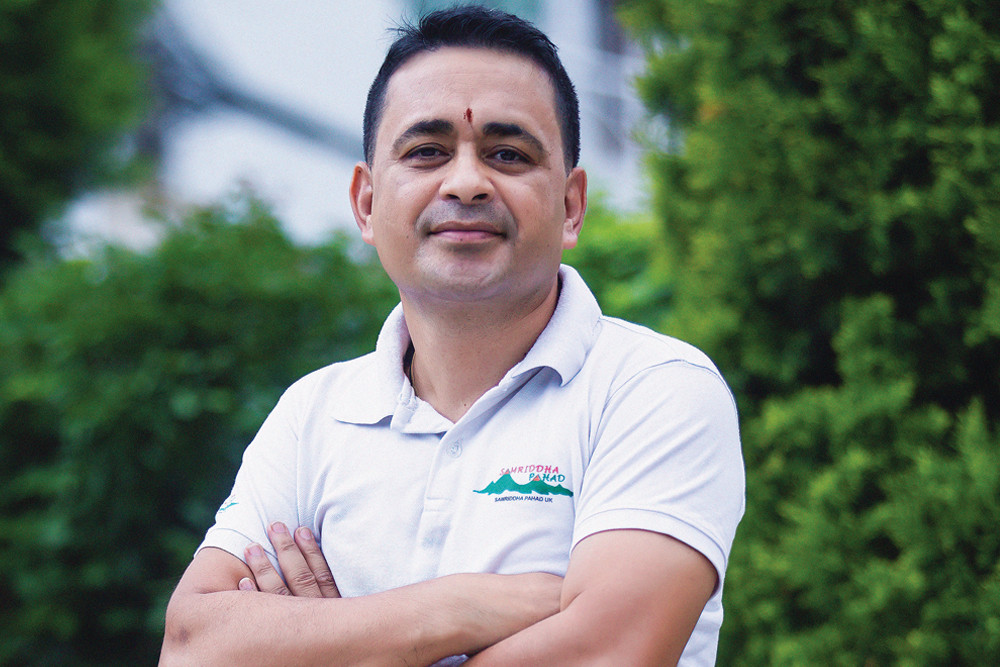-min-1717913881.jpg)
Ashutosh Tiwari is the Managing Director at SAFAL Partners, which is Nepal’s first business operations-focused investment firm. SAFAL works with small and medium companies, helping them improve operational efficiency, attract investments and drive business growth. Through SAFAL, Ashutosh recently launched Nepal’s first angel investment network called SAFAL Angels, which has a network of 100 individual investors and an initial fund size of two crore rupees.
From 2014 to 2017, He was the CEO at Sherpa Adventure Gear-Nepal. At this export-oriented high-end outdoor gear company that manufactured its products Nepal, Ashutosh helped improve factory-related operations, supply chain and logistics, internal business processes, relations with women’s sewing-and-knitting co-ops, and the company’s global environmental and social compliance capabilities.
From 2010 to 2014, he was the Country Director at WaterAid Nepal, where he led a team of development professionals, civil engineers and public health experts to provide water, sanitation and hygiene services to marginalized communities – Dalits, school children, people with disabilities, among others -- in the Tarai and in the hills. In 2012, his peers in the international development community elected him Chairman of AIN, the Association of 114 International NGOs in Nepal.
“We can all only try to do good with the resources that we have in the time that we have in this life. The results of our hard work may not come within our lifetime, and that is alright. Still, that is no reason not to do the work to change the country for the better by helping create, in whatever way, genuine happiness in people’s faces”.
From 2007 to 2009, he was the CEO at Himalmedia, an influential media house, where he negotiated with militant labor unions and turned the company around financially and operationally.
In 2008, Ashutosh co-founded Entrepreneurs for Nepal (E4N), a community-driven institution that helped kick-start Nepal’s organised entrepreneurial ecosystem. E4N has an active online and offline presence with 90,000 members. Early in his career, Ashutosh worked for the International Finance Corporation (IFC) in Dhaka, Bangladesh and for German Technical Co-operation (GiZ) in Nepal.
In 2011, the World Economic Forum in Geneva honored Ashutosh as a Young Global Leader. Ashutosh is well-known in Nepal as a much sought-after teacher and mentor to entrepreneurs and young professionals.
In this edition of Business 360, he shares his thoughts on leadership. Excerpts:
What is your definition of leadership?
To me, leadership is taking one’s family, or one’s community, or one’s village or city, or one’s company or organisation or one’s team or even one’s country to the right future. The operative phrase here is ‘the right future’. There are people who take us to a wrong future, and they cannot becalled leaders.
Most of us are concerned about the present, busy with the here and now. But our leaders look up ahead in the distance, and they have a sharper sense with regard to how to take us to a better, brighter future.
You have worked across several industries, what drove you to have and excel in such a variety of experiences?
Truth be told, whatever career plans I had for myself did not work out. But whatever career plans I did not have worked out so much better than anything I could have ever planned. This direct experience has made me a great believer in the significance ofrandom good luck in life.
I was just incredibly lucky in that when opportunities to lead organisations presented themselves, I was either available or ready, and that was really that. And in all professional contexts, whatever I knew, I applied it to the best of my ability; whatever I did not know, I learnt – continuously from my colleagues and on my own.
At Himalmedia, for instance, I applied not only the sort of management I knew but also got to practice the sort of management that dealt with risks, uncertainties, labour unions, and corporate turnarounds. At WaterAid-Nepal, I saw how an organisation’s stakeholders such as the government, NGOs, donors, headquarter colleagues, public health and engineering experts, communities and the media could come together to make lives of the poor so much better with a round-the-clock availability of safe drinking water and sanitation facilities. At Sherpa Adventure Gear Nepal, I learnt the nitty-gritty of running a large-scale business that had sophisticated demanding international customers on one end, and volatile supply chain management and logistics on the Nepal side. At SAFAL, I am learning the game of investments by focusing on growth-oriented companies’ operational efficiency.
On reflection, it is fair to say that a large dose of luck and a drive to continuously learn what I do not know have led me to have the sort of career that I have been fortunate to have.
-min-1717913881.jpg)
What do you make of Nepal’s economic position?
By and large, I remain bullish on Nepal.
It’s fair to say that our political establishmenthas spent the last 25 years doing a lot of internal house-keeping work, so to speak. Now that the Constitution is there, the elections are over, the seven provinces are up and running, the mayors and village councilors are busy with local development issues, Nepal’s and Nepalis focus will be on holistic development that raises not only the standards of living but also the quality of life.
On one hand, that means more work on infrastructure such as roads, highways, bridges, water utilities, communication technologies, health centers, and so on. On the other hand, that means a rising demand for better education, training and informational resources, greater accountability on the part of the politicians, more industrialisation that creates jobs, greater ease in starting and running businesses, and, essentially, a desire for prosperity that is inclusive and that focuses on people’s well-being.
Barring natural or man-made disasters, and barring policies that restrict Nepalis’ degrees of freedom, all these signs bode well for a higher economic growth.
What challenges do entrepreneurs face in the country?
Entrepreneurship is about working very, very hard on a promising but uncertain market opportunity that comes with absolutely no guarantee of success. Viewed this way, entrepreneurship is always challenging, no matter what, where and at what age you do it.
We Nepalis are generally entrepreneurial people. But our level of entrepreneurialism is limited mostly to small sole proprietorship ventures, which do not grow at scale. Partly, this is the result of regulations and rules, and partly this is the result of how we have always done business - not to thrive in a big way but only to survive in small way.
When our businesses do not grow at scale, productivity does not go up, more jobs for more people cannot be created, better labour, environmental, social and quality standards cannot come about, more taxes cannot be collected, companies’ management and governance cannot be made better, more public or investors’ capital cannot be pooled and used for bigger investments through IPOs, and so on.
It is nice to romanticise small businesses, but unless we allow most of those small businesses opportunities to grow to be big businesses, large-scale jobs and efficiencies do not occur.
As such, the greatest challenge our entrepreneurs face is how to grow their businesses by attracting investments in a way that puts in better management, operational and governance systems, creates complicated but high-quality products for customers in different market segments, and gives better overall business results in return for a dilution of ownership.
How has nepotism influenced Nepali leadership and the country’s political sphere?
Wanting to give a leg-up to your children and relatives is a desire that is universal. I have no problem if a privately-owned business hires the owner’s family members for the restaurant or the factory or whatever. That is the owner’s choice, and it’s his business that shrinks or grows by the result of that decision.
But when you fill in public-sector jobs with your children and relatives or party cadres, then that’s a corrupt practice because you are using public money for your own people’s private gain. Besides, you are robbing the public sector of the talent it could otherwise gain through an open and fair competition.
In Nepal, direct and indirect nepotism is common along both family and party-political lines in many public sector jobs. This has served to insulate the “boss’s people” from getting caught evenwhen they commit misdeeds. A vigorously investigative press and vigilant civil society institutionscan draw public’s wrath against such practices.
Any role models who inspire you?
I take bits and pieces from many people’s good sides, and slowly copy them to internalise their traits as my own. This has been a lifelong effort on my part.
When confronted with difficulties in life, I like to re-read the Stoic philosophers - Seneca, Epictetus and Marcus Aurelius - and let their sensible thinking rub against my circumstances. I admire the way business giants such as Warren Buffet, Charlie Munger and Ray Dalio think through their decisions and choices about life, business and people. The number of hours Bill Gates reportedly still puts into reading books and learning new things is inspiring. I am impressed that Mozart became Mozart by sheer brutal hard work – not something we want to do, but which is required for exceptional performance. I like Obama’s seemingly cool, unflappable temperament.
Closer home, my parents have been good leaders in our large, extended family, steering family members in the direction of a right future. My wife’s calm sense of her own being and her readiness to smile at life’s nuisances are two traits I strive to grow in myself.
Advice for future leaders of Nepal…
More than advice, maybe some reflection: We can all only try to do good with the resources that we have in the time that we have in this life. The results of our hard work may not come within our lifetime, and that is alright. Still, that is no reason not to do the work to change the country for the better by helping create, in whatever way, genuine happiness in people’s faces.



.jpg)


.jpg)